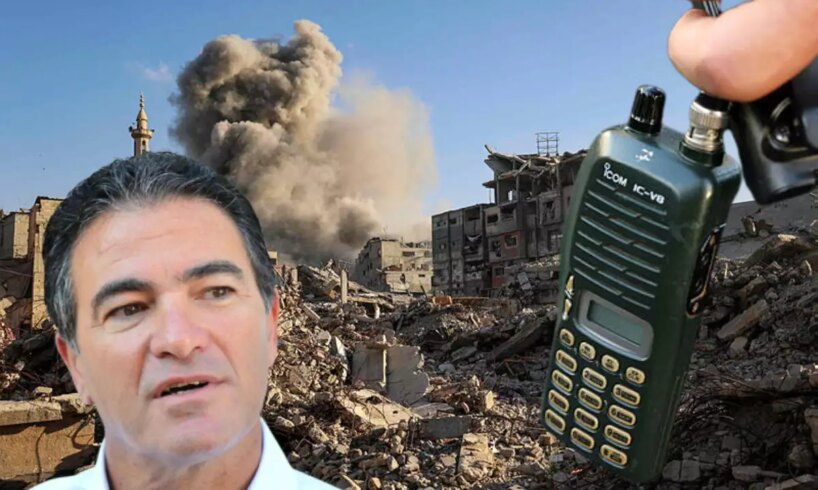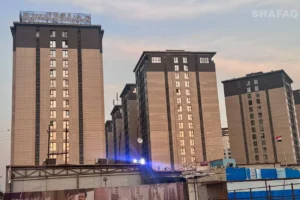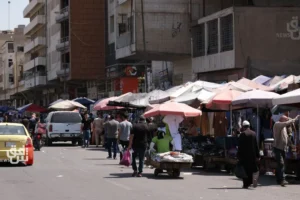
Yossi Cohen, the former head of Mossad who oversaw operations like the theft of the Iranian nuclear archive, has offered a stunning revelation regarding the true breadth of the agency’s global surveillance reach. Speaking on The Brink podcast on his career about the pager operation that hurt dozens of operatives in the terrorist organization in September 2024 by having the unwittingly turn on an explosive device on their communication devices that had been manipulated by Israel, Cohen insisted that the publicly recognized success against Hezbollah was merely one element of a far wider, systematic deployment of sophisticated devices worldwide, although notably abscent in the Gaza Strip.
In his remarks centered on the massive, ongoing infiltration using specialized technology that the equipment was “not only booby trapped” but specifically “manipulated equipment”.
When challenged on the extent of this intelligence collection, Cohen stated with absolute certainty that he alone knew the scale of the operation: “You know how many equipment I mean treated equipment that we have in these countries? You can’t. You don’t. I do”. When asked to name specific countries, he equivocated but revealed that this treated equipment is spread across virtually every potential theater of operation, confirming that these devices are present “in all the countries that you can imagine”.
An ambulance arrives at the American University of Beirut Medical Center (AUBMC) after an incident involving Hezbollah wireless devices in Beirut, Lebanon, 17 September 2024 (EPA/Wael Hamzeh)
This massive global reach stems from a concept Cohen claims to have personally invented. He described this strategy as both the “pager method” and the “manipulated equipment method,” which he developed between “2002 to 2004”. The core strategic mandate behind this invention is to bypass traditional barriers by embedding oneself in the enemy’s logistics: “If I know that or Iran or other countries or other organizations are buying something that I can be part of their supply chain, I will do”. Cohen confirmed that his concept was already in use historically, noting: “We have already used it, manipulated equipment in Second Lebanon War,” referring to the Israel-Hezbollah clash in 2006.
The invention and early development relied heavily on collaboration with technical leadership within Mossad. Cohen stressed “the manipulated equipment method,” which he called it, was developed with the head of the tech division in the Mossad. “He was my best partner.”
The preparations for the public funeral ceremony for late Hezbollah leaders Hassan Nasrallah and Hashem Safieddine, who were killed in Israeli airstrikes in 2024 (Reuters / Mohammed Yassin / TPX)
Despite the pervasive nature of the system, Cohen offered a crucial contrast regarding the presence of this equipment in the Gaza Strip. When questioned about the operational deployment there, he admitted to a significant deficit, noting, “Not Gaza. Not enough”. He suggested that had the intelligence capability been stronger in Gaza, operations might have unfolded differently, implying a missed opportunity: “If we had it, I mean, we knew something about them coming something, right? I would have sold them everything. Just everything. I mean, you get the measurement”.
Yossi Cohen confirmed that he faced severe institutional opposition from both the Shin Bet (Shabbak) and the IDF when he attempted to assume control of intelligence operations concerning the Gaza Strip prior to Oct. 7. The interviewer introduced the subject by noting that when Cohen “first came in as head of Mossad, [he] saw that there was not enough intelligence coming in from Gaza”. Recognizing this crucial deficiency, Cohen, according to the interviewer, actively “begs to be put in charge of Gaza” in an effort to implement necessary changes, particularly as he had identified that the existing security establishment functioned like an “echo chamber”.
Police officers inspect a car inside of which a hand-held pager exploded, Beirut, Lebanon, Tuesday, Sept. 17, 2024 AP
Cohen justified documenting this internal struggle in his book, stating that he decided to “take my gloves off a little” because “the people should know, all right, my position, the people should know Mossad’s position”. He framed his public criticism as necessary to highlight the organization’s unique value, asserting that “The people should know and appreciate Mossad’s capabilities more”. By drawing attention to the Mossad’s efficacy, Cohen implicitly argued that its proven capabilities – developed over 38 years of dedicated service, during which he “didn’t sleep… because of that” – were being improperly restricted due to institutional ego.
But this initiative was forcefully rejected by the agencies that traditionally held jurisdiction over the area. Cohen confirms he was “blocked” by the “Shinbetת the equivalent of the MI5,” and the “the IDF Intelligence Directorate as well”. Cohen suggested that this blocking maneuver stemmed from a deep-seated cultural arrogance within these organizations, summarizing their attitude as: “The culture says we’re okay right, we don’t need you, we’re fine, don’t tell us what to do, we are the IDF, we are Shin Bet, the equivalent to MI5.”
Cohen stressed that the factual basis for his critique – that the intelligence was lacking – was undeniable and had been previously communicated. He confirmed that he had told and written that they “have nothing sufficient on the level of intelligence” prior to Oct. 7. He noted that the truth of this failure was widely acknowledged within the intelligence community: “If you ask my subordinates at Mossad, everybody remembers that. Everybody at the Shin Bet remembers”. Cohen challenged the agencies for not denying the facts openly, concluding, “Of course, it is the truth”.
A pager following the detonation by the Israeli Mossad (AP) AP
The consequence of being blocked was a critical gap in capabilities. Cohen lamented that while the Mossad was successful elsewhere, noting that if they had sufficient coverage, they could have “sold them [Hamas] everything [manipulated equipment]”. Intelligence on Gaza was dangerously limited, confirming that it was “Not Gaza. Not enough”. He emphasized that Mossad’s capabilities were “so low in Gaza” compared to successful operations in Lebanon and Iran, underscoring his frustration with the resistance by stating that when agencies “do understand that the level of intelligence is so poor, do something about that”.





